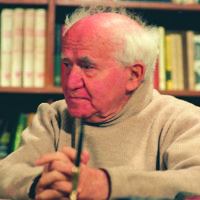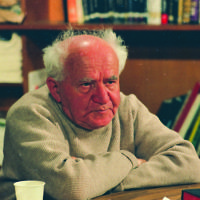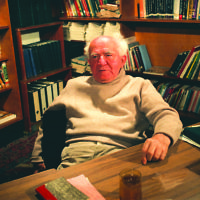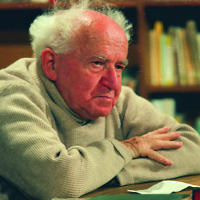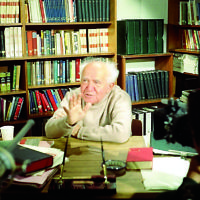Ben-Gurion unplugged: New film shows previously unseen footage of Israel’s founder
The chance finding of a film featuring David Ben-Gurion, Israel’s first prime minister, has been turned into a documentary
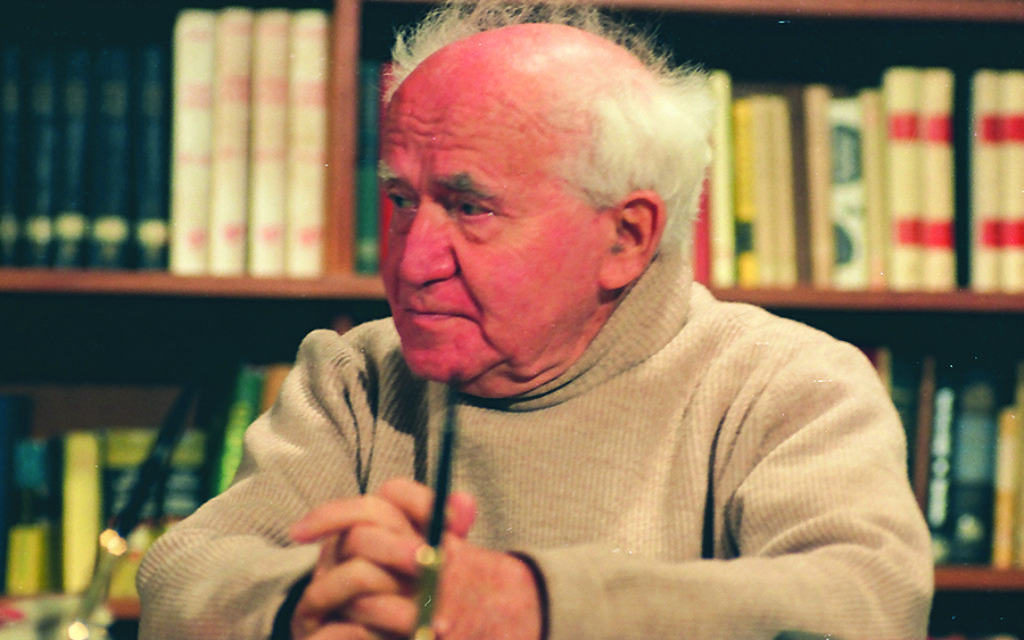 Ben-Gurion on the set of the 1968 Interview Photo Courtesy of David Marks
Ben-Gurion on the set of the 1968 Interview Photo Courtesy of David Marks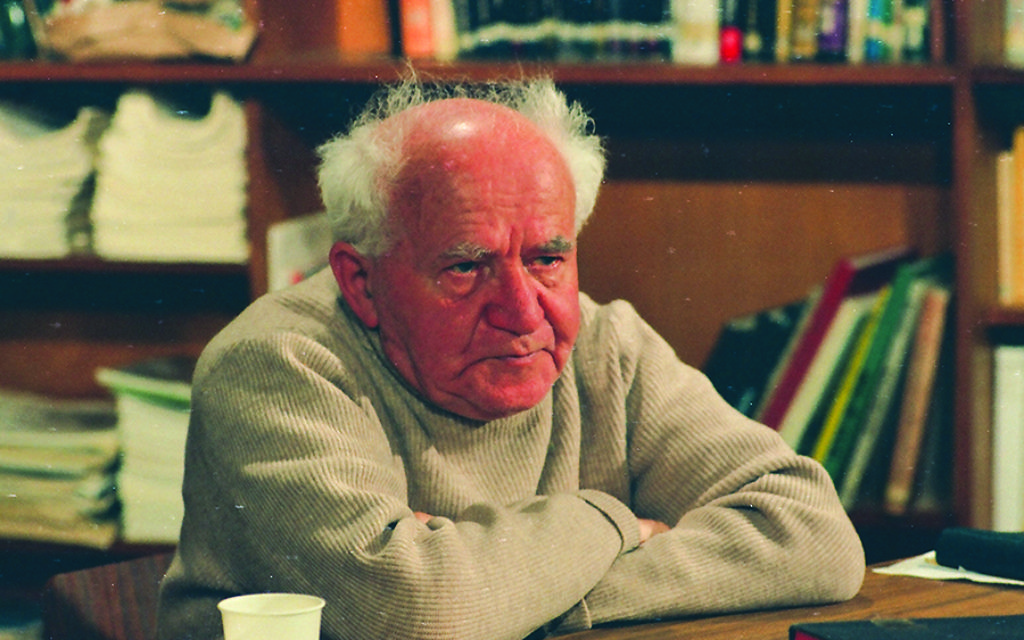 Ben-Gurion on the set of the 1968 Interview Photo Courtesy of David Marks
Ben-Gurion on the set of the 1968 Interview Photo Courtesy of David Marks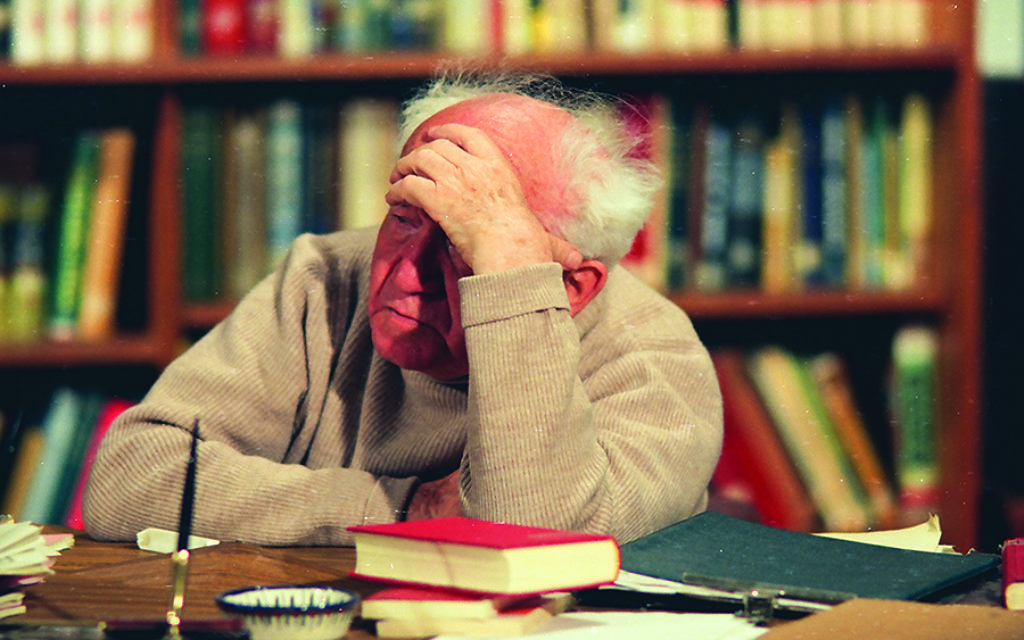 Ben-Gurion on the set of the 1968 Interview Photo Courtesy of David Marks
Ben-Gurion on the set of the 1968 Interview Photo Courtesy of David Marks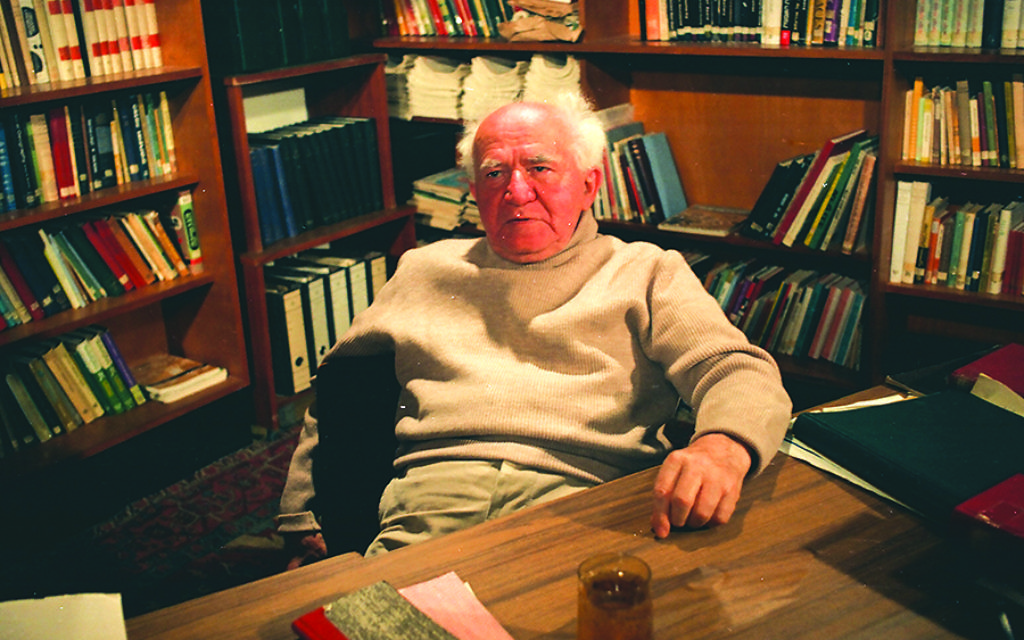 Ben-Gurion on the set of the 1968 Interview Photo Courtesy of David Marks
Ben-Gurion on the set of the 1968 Interview Photo Courtesy of David Marks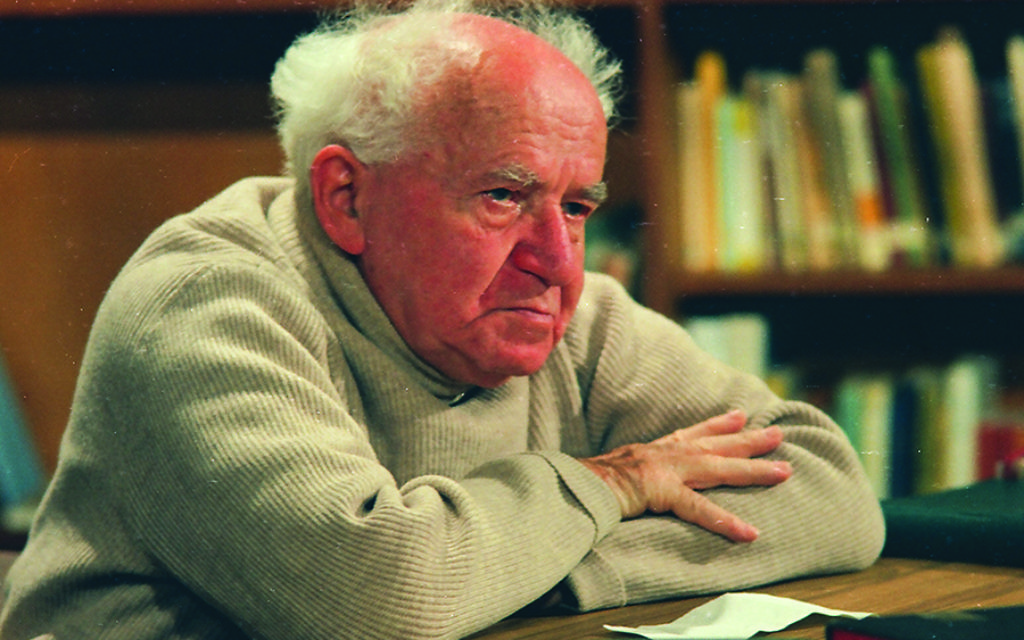 Ben-Gurion. Photo Courtesy of David Marks
Ben-Gurion. Photo Courtesy of David Marks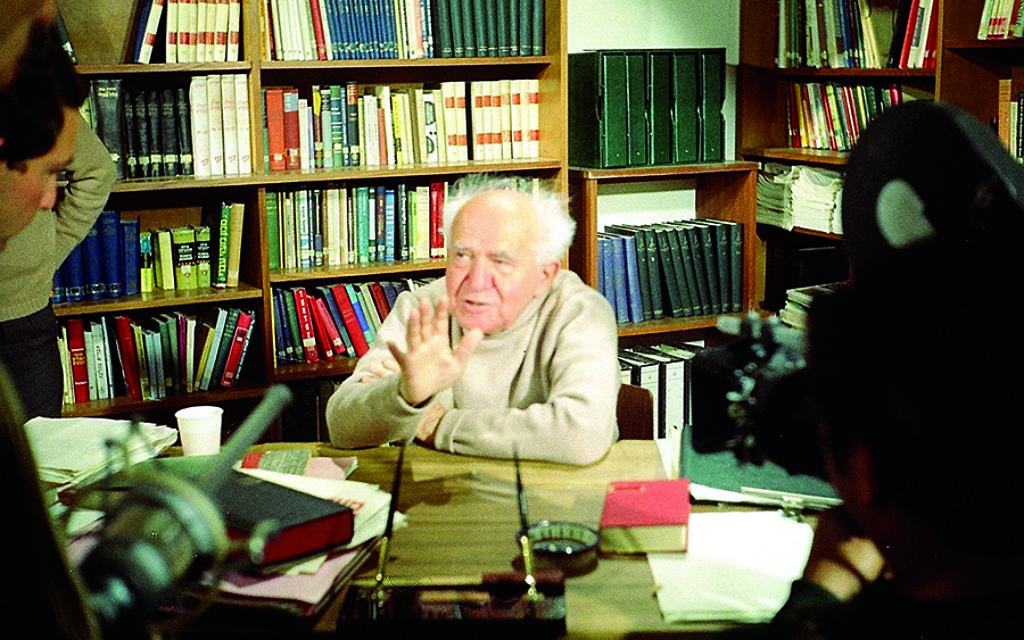 Ben-Gurion mid interview (1968) Interview Photo by Malcolm Stewart
Ben-Gurion mid interview (1968) Interview Photo by Malcolm Stewart
An intimate six-hour interview from 1968, recorded in the sweltering heat of the Negev desert, with Israel’s most iconic leader, aged 82, for half a century thought lost or destroyed, but now found, by chance, hiding away in reels of film in the corner of a dusty archive, after a year-long worldwide search involving an 88-year-old British man who was there at the time.
It’s the stuff of documentaries. So they made one.
David Ben-Gurion was 82 when sound recorder Malcolm Stewart joined producer and fellow Brit Melville Mark in Sde Boker, then a collection of huts, where the great statesman had retired to write his history of Zionism. Three days of setting up, including the erection of a temporary studio, preceded three days of interviewing, the crew filming in the early morning and early evening, when it was cool enough to do so without the sound of the air conditioning disrupting the audio.
Get The Jewish News Daily Edition by email and never miss our top stories Free Sign Up
They were interviewing Ben-Gurion for research purposes, to create a script for a motion picture about his life. That film never got made, but the interview itself was considered by all involved to be among the most insightful glimpses into the thinking and personality of Israel’s founding father. Forgotten, it then got lost.
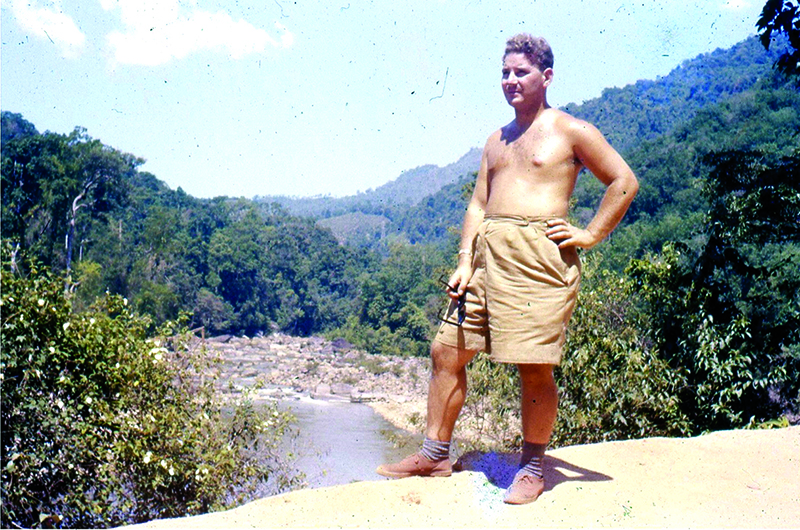
Photo Courtesy of Malcolm Stewart
Forty-six years later, Israeli director Yariv Mozer was lurching from pile to pile in the deep underbelly of the the Steven Spielberg Film Archive in Jerusalem, looking for something else, when he stumbled across a box of 35mm file, intriguingly marked. He soon realised he had found the visuals of the lost interview, a golden find, but it was, alas, only the visuals – six hours of silent footage, shot in the pre-digital age, when sound was recorded separately. Heartbreakingly, Ben-Gurion was speaking, but no one could hear.
“Then Yariv called, in 2014, out of the blue,” says Stewart, a pioneer of British film-making who has worked with Stanley Kubrick, among others. Mozer had tracked down Stewart to Pinner, and explained what he’d found, and that he was working with Yael Perlov, daughter of Israeli David Perlov, who headed the 1968 team. On hearing the news, Stewart was able to point them to the exact place in the sprawling Ben-Gurion Archive in the Negev where he had placed his own personal copy years earlier. Lo and behold, they found the soundtrack, obscurely marked ‘Ben-Gurion’. That’s when the hard work began.
“It took months for us to match the audio,” says Mozer. The task was painstaking because the technology used then no longer exists today. “We had the transcript, thankfully, so slowly, slowly, we pieced it together. I became an expert at lip-reading our first prime minister!”
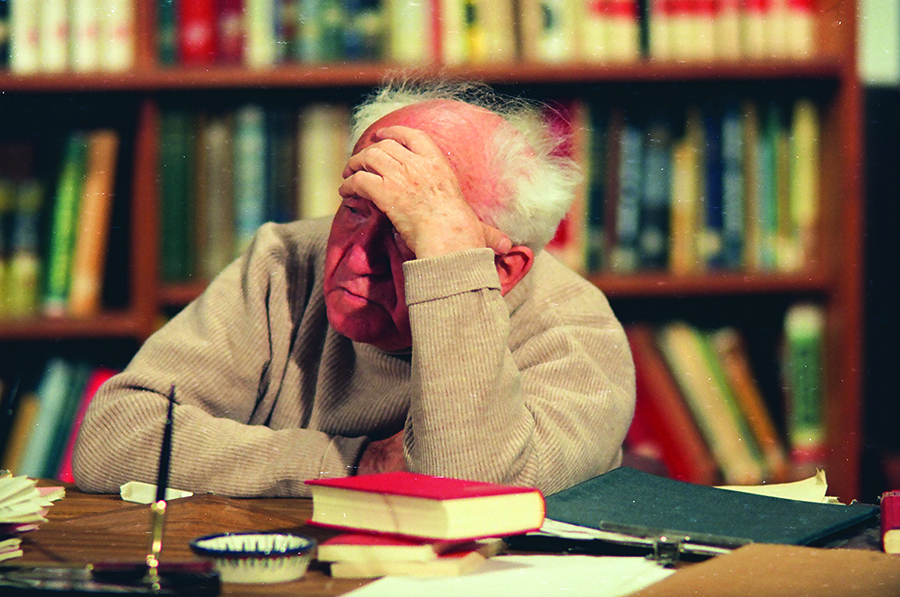
Photo Courtesy of David Marks
The result is Mozer’s hour-long documentary, comprising Ben-Gurion in his own audible words, a never-before-seen interview of him speaking about all manner of topics, ranging from Zionism, his childhood, his arrival in Israel, Churchill and Britain’s choice not to bomb the camps, his political decisions, including his controversial reparations deal with Germany, the West Bank settlements, which he criticised, and his vision for the country. Released next year, it is an encounter Stewart remembers well.
“I’d been very impressed by Ben-Gurion, so I flew in from my studio in Geneva and worked for free,” he recalls. “He ran rings round the interviewer [American college graduate Clinton Bailey]; the difference in intellect was enormous. I remember he’d go for afternoon walks with his bodyguards, and we’d go with him. He loved my story about how I’d spent two years in Germany after the war, in Forces broadcasting, managing a team of five ex-SS men, one of whom had been a colonel.”
From their time together, Stewart was most struck by the power of Ben-Gurion’s ideas, and it is this that really comes through in the documentary. “It revisits Ben-Gurion’s outlook and prophecy,” says Mozer. “The final 10 years in the life of the leader, a time when he had found himself outside Israeli politics, removed from all leadership discourse, allowed him a hindsight perspective on the Zionist enterprise.”
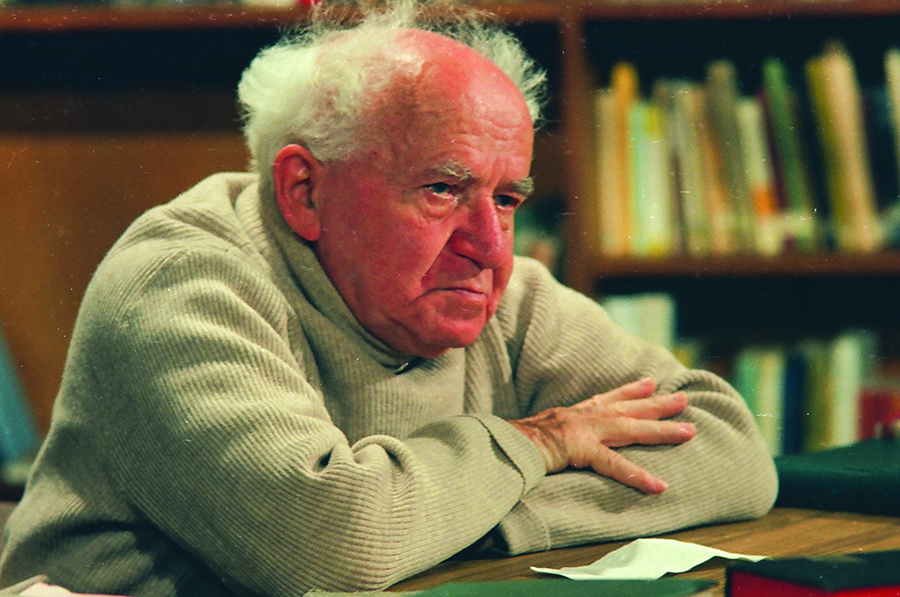
Photo Courtesy of David Marks
This month, Stewart attended an advance screening at the Israeli ambassador’s house in London, along with fellow Londoner David Marks, whose late father Melville – later revealed to be an ex-Mossad agent – helped produce the interview.
“It was very moving for me to see it,” said Marks, the architect who designed the London Eye, and who was there himself at the time, as a teenager. “I remember him. He was the most genial, sparkling, bubbly, vivacious human being, but I didn’t understand at the time the importance of what they were doing. This was 1968, Ben-Gurion was 82, and nobody was making films in Israel then [Israeli film-making only really started in the 1970s], so I find it extraordinary my father had the vision to know that they had to record it, using the latest technology available in Britain, and record it quickly, for the heritage of the Jewish people.”
Asked how he felt, 48 years later, about Ben-Gurion’s thoughts on Zionism, Marks says: “He still stands as a beacon of hope, even today, in this ‘post-truth’ world. He lived in a world of truth, and this interview is a reminder of a time when politicians spoke of truth and hope. For Yariv and Yael to bring it back to life in the way that they have, after almost half a century, is heart-warming to say the least.”
Mozer agrees. “There is an absence of leadership with those values and that vision,” he says, perhaps explaining what he calls “the interest of some young Israelis to turn back to our history, to our past, in order to find answers for today and maybe for the future”.

Thank you for helping to make Jewish News the leading source of news and opinion for the UK Jewish community. Today we're asking for your invaluable help to continue putting our community first in everything we do.
For as little as £5 a month you can help sustain the vital work we do in celebrating and standing up for Jewish life in Britain.
Jewish News holds our community together and keeps us connected. Like a synagogue, it’s where people turn to feel part of something bigger. It also proudly shows the rest of Britain the vibrancy and rich culture of modern Jewish life.
You can make a quick and easy one-off or monthly contribution of £5, £10, £20 or any other sum you’re comfortable with.
100% of your donation will help us continue celebrating our community, in all its dynamic diversity...
Engaging
Being a community platform means so much more than producing a newspaper and website. One of our proudest roles is media partnering with our invaluable charities to amplify the outstanding work they do to help us all.
Celebrating
There’s no shortage of oys in the world but Jewish News takes every opportunity to celebrate the joys too, through projects like Night of Heroes, 40 Under 40 and other compelling countdowns that make the community kvell with pride.
Pioneering
In the first collaboration between media outlets from different faiths, Jewish News worked with British Muslim TV and Church Times to produce a list of young activists leading the way on interfaith understanding.
Campaigning
Royal Mail issued a stamp honouring Holocaust hero Sir Nicholas Winton after a Jewish News campaign attracted more than 100,000 backers. Jewish Newsalso produces special editions of the paper highlighting pressing issues including mental health and Holocaust remembrance.
Easy access
In an age when news is readily accessible, Jewish News provides high-quality content free online and offline, removing any financial barriers to connecting people.
Voice of our community to wider society
The Jewish News team regularly appears on TV, radio and on the pages of the national press to comment on stories about the Jewish community. Easy access to the paper on the streets of London also means Jewish News provides an invaluable window into the community for the country at large.
We hope you agree all this is worth preserving.
-
By Laurent Vaughan - Senior Associate (Bishop & Sewell Solicitors)
-
By Laurent Vaughan - Senior Associate (Bishop & Sewell Solicitors)
-
By Laurent Vaughan - Senior Associate (Bishop & Sewell Solicitors)
-
By Laurent Vaughan - Senior Associate (Bishop & Sewell Solicitors)


